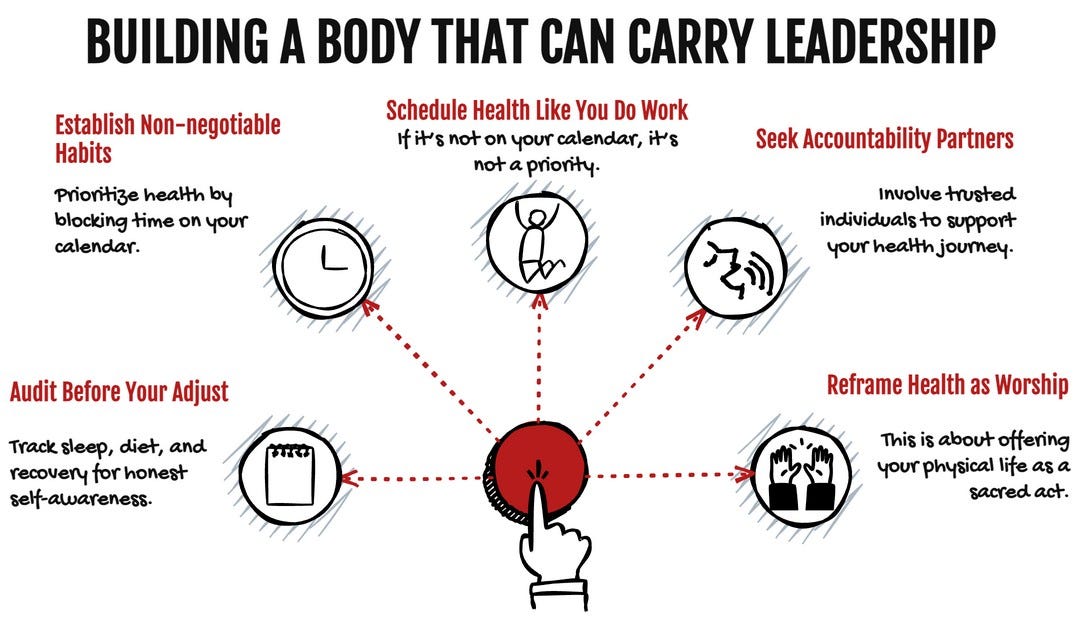5 Habits That Turn Burnt Out Leaders into High Performers
Most leaders focus on skills and strategy. Few realize their body might be sabotaging their impact.
At some point, every leader hits a wall.
The calendar is full, the energy is low, and the responsibilities keep multiplying. You don’t feel sick but you don’t feel well either. You're not collapsing but you're definitely not thriving. And eventually, what started as “just a busy season” turns into an unsustainable way of life.
Here's the reality: leadership will always demand more from you than it gives back. That's why leaders who don’t prioritize their health end up leading on empty, and those who lead on empty eventually lead others into emptiness too.
In elite performance environments, whether in the boardroom, the pulpit, or the military, the data is undeniable. Those who rise to the top and stay there understand that physical health isn’t a personal luxury. It’s a leadership multiplier.
This article isn’t about fitness trends or restrictive diets. It’s about how building health into your daily rhythm strengthens the clarity, resilience, and spiritual conviction required to lead others well over the long haul.
Let’s connect the dots between your physical discipline and your divine calling.
If you're called to lead, then you're called to steward your strength.
The body God gave you isn't just a container, it's a tool. And when you neglect that tool, you don’t just pay a personal price. You limit your influence.
What most leaders fail to realize is that fatigue doesn't just make you tired. It makes you vulnerable. Spiritually, emotionally, and mentally.
The enemy doesn’t have to destroy you if he can just exhaust you.
Which is why Scripture calls us to a more integrated way of living that honors God not only in our actions but also in our stewardship of the body He designed.
That’s where Romans 12:1 gives us both challenge and clarity.
"Therefore, I urge you, brothers and sisters, in view of God’s mercy, to offer your bodies as a living sacrifice, holy and pleasing to God—this is your true and proper worship." — Romans 12:1 (NIV)
Paul doesn’t separate body from calling. He doesn’t treat the physical as irrelevant to the spiritual. In fact, he does the opposite.
He makes it clear that presenting your body to God is a spiritual act. It's not just about abstaining from sin. It's about using every part of you, including your physical capacity, as a platform for worship.
This is where Christian leadership begins to differentiate itself. You aren’t just managing energy. You’re stewarding a temple. You're not just optimizing performance. You're offering your whole self (mentally, emotionally, and physically) to the purposes of God.
Health Is a Leadership Issue
Paul’s exhortation in Romans 12 comes after 11 chapters of deep theology. He’s spent the first half of the letter laying out God’s redemptive plan for humanity, and now he’s turning the corner into application.
His language is strong: “I urge you.” This isn’t a suggestion, it’s a spiritual imperative.
And notice what it’s based on: not guilt, not fear, but mercy. In view of God’s mercy, your response is to present your body as a living sacrifice.
Why the body?
Because the body is where obedience plays out. It’s what carries you into difficult meetings, late-night phone calls, early morning prayer, and the slow, steady grind of faithful leadership.
If your body is failing, your leadership will soon follow.
Let’s walk through five essential health habits that can recalibrate your physical life and multiply your leadership effectiveness.
1. Prioritize Rest Like Your Influence Depends On It
Rest is not a reward for productivity. It's a requirement for sustainability.
If your day begins with a foggy mind and ends with irritability, chances are your rest rhythm is broken. And here’s what most leaders forget: fatigue eventually becomes spiritual.
When you're tired, you lose discernment. You exaggerate problems. You lose empathy. You drift from purpose.
Jesus modeled the power of rest even in the middle of intense ministry. He often withdrew to solitary places. It wasn’t because he lacked power, but because He understood pace.
Leaders who build rest into their routine actually accelerate their long-term impact. They're not falling behind they're staying ready.
Make your sleep environment non-negotiable. Darkness, consistency, and device-free space. Invest in the place you recharge. Your future decisions depend on it.
2. Exercise for Mental Clarity, Not Vanity
You’re not training for a bodybuilding competition. You’re training to keep leading with focus and strength.
Physical is more than just for aesthetics. It’s for alertness. It’s for emotional regulation. It’s for sharpness in moments when others fold.
Regular movement boosts serotonin, reduces cortisol, and strengthens immune response. That’s more than just fitness jargon. That’s a secret weapon for leadership longevity.
One pastor I coach introduced three 20-minute walk breaks spaced throughout his 8-hour day. Not only did his blood pressure drop, but his staff said he became noticeably more positive, patient, and present.
Movement builds margin into your mind.
Start where you are. Walk. Stretch. Cycle. Lift. But make it consistent. Leaders don’t wait for time, they create it.
3. Eat to Lead, Not Just Survive
We must go beyond feeding our cravings and begin fueling your leadership.
The Bible doesn’t avoid this conversation. Daniel’s decision in Babylon wasn’t centered on food preferences, it was centered leadership readiness. He refused to fill himself with what would negatively alter his discernment.
Nutrition is leadership fuel. A steady diet of processed sugar, caffeine spikes, and fast food goes beyond just sabotaging your waistline. It slows your mind. It weakens your immunity. It disrupts your sleep. At the end of the day, it dulls your leadership.
Start small. Protein with every meal. Fiber for stability. Hydration for clarity. Cut one thing that steals your energy and replace it with something that sustains it.
Don’t eat like a college student. Eat like a leader preparing for war.
4. Create Daily Margin for Emotional Recovery
You don’t need a longer vacation. You need a daily recovery system.
The mistake most leaders make is assuming that emotional exhaustion is fixed by physical rest. It’s not. You can sleep 10 hours and still wake up emotionally numb.
Recovery isn’t just about rest. It’s about healthy connection.
This is where practices like journaling, prayer walks, quiet time, and even therapy play their part. When leaders don’t process their stress, it eventually leaks out in their tone, their temper, and their relationships.
Jesus didn’t just rest, He reflected. He asked questions. He connected with the Father.
You need a space to name what you’re carrying before you drop what matters most.
5. Lead From Overflow, Not Depletion
You can’t minister out of depletion. In fact, the healthiest leaders won’t even try. They understand that leading another person from a place of depletion is irresponsible and dangerous.
Leadership isn’t about holding everything together while silently falling apart. It’s about living from a place of health that allows you to pour out into others without running dry.
That’s why Paul urges us to “offer your bodies.” Not once, but as a living, ongoing sacrifice. That requires fuel. That requires awareness. That requires intention.
When your physical life is neglected, your spiritual life will eventually feel distant. But when your body is being stewarded well, your spirit often finds clarity, strength, and renewal.
Building a Body That Can Carry the Weight of Your Calling
Spiritual strength doesn't exempt you from physical stewardship.
It’s tempting to think that because God has called you, anointing alone will carry you. But over time, even the most gifted leaders crumble under the weight of poor health habits. The body you ignore today will become the obstacle you face tomorrow.
The good news is this: change doesn’t require overhauling everything overnight. It begins with a few intentional steps done consistently. Here’s a framework to build on.
1. Audit Before You Adjust
Start with honest awareness. Track your sleep, movement, food intake, and recovery for seven days. You can’t lead what you won’t measure.
Ask:
How many hours am I truly sleeping?
What am I reaching for when stress spikes?
How do I recover after emotionally draining moments?
What are my current non-negotiables and are they serving my health?
Self-awareness is the gate to self-leadership. Don’t guess. Get data.
2. Establish Non-negotiable Habits
Keystone habits are behaviors that trigger positive ripple effects across other areas of life. Identify one health habit that, when improved, improves everything else.
Examples:
A 30-minute walk every morning sets the tone for emotional control and creative thinking.
Drinking a full glass of water before every meal curbs cravings and sharpens alertness.
Going to bed at the same time every night regulates hormones and improves mood.
Stack small wins. Over time, they lead to transformation.
3. Schedule Health Like You Schedule Meetings
If it’s not on your calendar, it’s not a priority.
Stop waiting for spare time. It won’t come. Great leaders protect their health by designing it into their day, not squeezing it into the margins.
Block time for meals, movement, and margin. Schedule your bedtime. Set alarms to stretch, breathe, or reset throughout the day. Build a rhythm that supports your output.
Your future doesn’t need a more motivated version of you. It needs a more structured one.
4. Establish Accountability and Encouragement
Change is hard. But it’s harder alone.
Ask a trusted friend, spouse, or mentor to walk this with you. Share your goals. Invite feedback. Celebrate progress.
Better yet, create a leadership circle where health is the norm, not the exception. Too many Christian leaders normalize dysfunction, fatigue, and overwork and call it sacrifice.
But true sacrifice in Scripture is holy, pleasing, and sustainable. God never asked you to destroy yourself for His work. He asked you to offer yourself fully…body included.
Accountability is what turns good intentions into lifelong habits.
5. Reframe Health as Worship
This isn’t about chasing aesthetics or self-help hype. This is about offering your physical life as a sacred act.
Romans 12:1 tells us “This is your true and proper worship.”
That word “worship” is so much more than just singing on Sundays. It’s about aligning your entire life with God’s will.
That includes your diet, your rest, your boundaries, and your recovery.
When you embrace health as an extension of your faith, discipline becomes devotion. Exercise becomes obedience. Boundaries become wisdom. And your daily habits become a reflection of your eternal priorities.
Your Body Carries More Than Just Your Calling
The body you’re building today is the one that will carry your spouse through their toughest seasons. It’s the one that will walk with your kids into their most formative years. It’s the one that will stand in rooms you’ve prayed to be in, and it’s the one that will bear the emotional weight of people you’re called to lead.
Your health isn’t just about you. It’s about everyone God has entrusted to you.
So start today. Not with pressure. With perspective.
Choose one health habit to strengthen this week.
Track your consistency.
Invite accountability.
Give yourself grace but stay committed to growth.
Your influence is too important to be compromised by neglect. Your calling is too weighty to be carried by a body running on fumes.
Real leadership doesn't ignore physical stewardship. It integrates it.
Because when you lead from overflow, not survival, everyone under your leadership gets better. Your team sees clarity. Your family feels presence. Your community experiences strength.
And your calling becomes sustainable for the long haul.
WEEKLY COMMENT CHALLENGE: Comment below with ONE THING you’re going to tackle this week to get physically healthier.
Stay healthy leader.
—Jared



